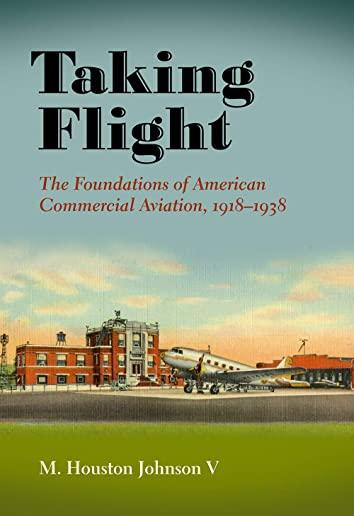
Johnson, M. Houston
product information
description
6Taking Flight explores the emergence of commercial aviation between the world wars--and in the midst of the Great Depression--to show that the industry's dramatic growth resulted from a unique combination of federal policy, technological innovations, and public interest in air travel.
Historian M. Houston Johnson V traces the evolution of commercial flying from the US Army's trial airmail service in the spring of 1918 to the passage of the pivotal Air Commerce Act of 1938. Johnson emphasizes the role of federal policy--particularly as guided by both Herbert Hoover and Franklin Roosevelt--to reveal the close working relationship between federal officials and industry leaders, as well as an increasing dependence on federal assistance by airline, airframe, and engine manufacturers.
Taking Flight highlights the federal government's successful efforts to foster a nascent industry in the midst of an economic crisis without resorting to nationalization, a path taken by virtually all European countries during the same era. It also underscores an important point of continuity between Hoover's policies and Roosevelt's New Deal (a sharp departure from many interpretations of Depression-era business history) and shows how both governmental and corporate actors were able to harness America's ongoing fascination with flying to further a larger economic agenda and facilitate the creation of the world's largest and most efficient commercial aviation industry.
This glimpse into the golden age of flight contributes not only to the history of aviation but also to the larger history of the United States during the Great Depression and the period between the world wars.
Historian M. Houston Johnson V traces the evolution of commercial flying from the US Army's trial airmail service in the spring of 1918 to the passage of the pivotal Air Commerce Act of 1938. Johnson emphasizes the role of federal policy--particularly as guided by both Herbert Hoover and Franklin Roosevelt--to reveal the close working relationship between federal officials and industry leaders, as well as an increasing dependence on federal assistance by airline, airframe, and engine manufacturers.
Taking Flight highlights the federal government's successful efforts to foster a nascent industry in the midst of an economic crisis without resorting to nationalization, a path taken by virtually all European countries during the same era. It also underscores an important point of continuity between Hoover's policies and Roosevelt's New Deal (a sharp departure from many interpretations of Depression-era business history) and shows how both governmental and corporate actors were able to harness America's ongoing fascination with flying to further a larger economic agenda and facilitate the creation of the world's largest and most efficient commercial aviation industry.
This glimpse into the golden age of flight contributes not only to the history of aviation but also to the larger history of the United States during the Great Depression and the period between the world wars.
member goods
No member items were found under this heading.
Return Policy
All sales are final
Shipping
No special shipping considerations available.
Shipping fees determined at checkout.







